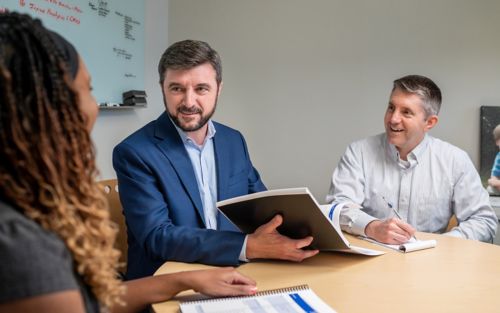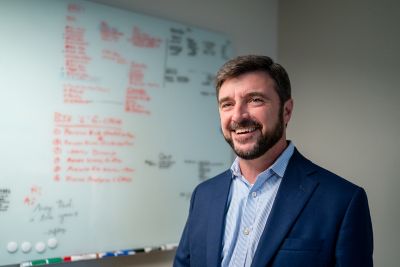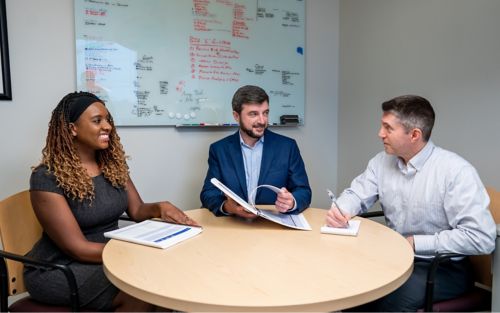St. Jude Family of Websites
Explore our cutting edge research, world-class patient care, career opportunities and more.
St. Jude Children's Research Hospital Home

- Fundraising
St. Jude Family of Websites
Explore our cutting edge research, world-class patient care, career opportunities and more.
St. Jude Children's Research Hospital Home

- Fundraising
Greg Armstrong, MD, MSCE
Leveraging clinical insights to advance childhood cancer survivorship research that improves health and quality of life for survivors
Overview
In the last six decades, advances in cancer therapies and supportive care have improved survival among children diagnosed with malignancies. Today, more than 85% of children who have cancer will survive at least five years after diagnosis, a remarkable increase in survivorship. However, with survival comes lifelong health consequences, as many children treated for cancer develop chronic health conditions and are at risk for early mortality. Understanding the risk of these chronic, late effects is critical as we develop health screenings and interventions to improve both lifespan and health span.

In the News
CCSS Report on Mortality: Childhood cancer survivors who maintan a healthy lifestyle had a 20% lower risk of mortality than those whose lifestyle was unhealthy. The study was reported in an article in The Lancet. Read about it.
In the news
Greg Armstrong, M.D., MSCE, named Chair of the Department of Epidemiology and Cancer Control at St. Jude Children’s Research Hospital. Learn more.
Armstrong Research Summary
As a physician-scientist in the Department of Epidemiology and Cancer Control, I have responsibilities in both the clinical and research spheres. On the clinical side, I provide care for neuro-oncology patients as well as long-term survivors of childhood brain tumors. My research is a natural extension of my clinical work, where I focus on the long-term health impact of the cancer therapies my patients and other survivors received.
I serve as the principal investigator (PI) of the Childhood Cancer Survivorship Study (CCSS), a multi-institutional and multidisciplinary collaborative resource for evaluation of the long-term outcomes of children with cancer who survived five or more years after diagnosis. Continuously funded by the National Cancer Institute since 1994, the CCSS is the world’s largest established open resource for survivorship research. The CCSS has more than 38,000 eligible survivors available for investigation of late mortality and more than 25,000 participants who have contributed valuable information on health-related and quality-of-life outcomes. The CCSS includes comprehensive information on treatment exposures, ongoing longitudinal follow-up, and an established biorepository from which genotype (SNP array) and DNA sequencing of survivors are available.
As the CCSS continues to grow and evolve, participating investigators and institutions are expanding the collection of data to evaluate the physiologic and neurocognitive function associated with aging. We are working to characterize accelerated aging in childhood cancer survivors and investigate the underlying pathophysiology of survivors as they enter their fourth, fifth, and sixth decades of life.
Given the unique healthcare needs of survivors, we are conducting health services research through the CCSS to evaluate patient, provider, and health care system factors and their associations with access, quality, and the cost of care. Ultimately, we aim to provide a resource to identify how survivors’ healthcare quality influences outcomes.

In addition to my role as PI for the CCSS, I serve as the co-program leader for the Cancer Control and Survivorship Program, one of the five major programs within the St. Jude Comprehensive Cancer Center. I also have a robust line of research inquiry that has evolved into an intervention trial for frailty and senescence. Over the last decade, it has become evident that the biological age of childhood cancer survivors may be advancing faster than their chronological age. To better understand the biology behind that advanced physiologic aging, I collaborate with a colleague from the Mayo Clinic on a placebo-controlled intervention that tests the efficacy of senolytic agents. These agents halt a process called cellular senescence—one of the mechanisms responsible for premature aging—and the trial explores whether these drugs help improve frailty and senescence in cancer survivors.
All my work seeks to advance our knowledge of childhood cancer survivorship so we may ultimately improve quality of life and outcomes well past the initial years of survivorship.

Learn more
Selected Armstrong Publications
About Greg Armstrong
Dr. Greg Armstrong is a Member of the St. Jude Faculty and Chair of the Department of Epidemiology and Cancer Control. He leads clinical outcomes research on the long-term outcomes of childhood cancer survivorship. In his clinical research role, most notably as the Principal Investigator for the Childhood Cancer Survivorship Study, Dr. Armstrong’s work contributes to significant strides in survivorship advancements. In addition to his clinical research work, Dr. Armstrong co-chairs the St. Jude Lifetime (SJLIFE) Cardiopulmonary Working Group, and he is a co-program leader for the Cancer Control and Survivorship Program. He earned his MD from the University of Alabama Medical School and his Master of Science in Clinical Epidemiology from the University of Pennsylvania.

Contact Greg Armstrong
Greg Armstrong, MD, MSCE
Member and Chair, Epidemiology and Cancer Control
Department of Epidemiology and Cancer Control
MS 735
St. Jude Children's Research Hospital
Memphis, TN, 38105-3678 USA
Follow Us

Memphis, TN, 38105-3678 USA GET DIRECTIONS